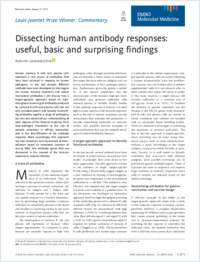Dissecting human antibody responses: useful, basic and surprising findings
- Lanzavecchia, Antonio Institute for Research in Biomedicine (IRB), Faculty of Biomedical Sciences, Università della Svizzera italiana, Switzerland
-
23.01.2018
Published in:
- EMBO molecular medicine. - 2018, vol. 10, p. e8879
English
Human memory B cells and plasma cells represent a rich source of antibodies that have been selected in response to human pathogens. In the last decade, different methods have been developed to interrogate the human memory repertoire and isolate monoclonal antibodies. I will discuss how a target‐agnostic approach based on high‐throughput screening of antibodies produced by cultured B cells and plasma cells has not only provided potent and broadly neutralizing antibodies against a range of pathogens, but has also advanced our understanding of basic aspects of the immune response, from host–pathogen interaction to the role of somatic mutations in affinity maturation and in the diversification of the antibody response. Most surprisingly, this approach has also revealed a new mechanism of diversification based on templated insertion of non‐Ig DNA into antibody genes that we discovered in the context of the immune response to malaria infection.
- Language
-
- English
- Classification
- Biology, life sciences
- License
- Open access status
- gold
- Identifiers
-
- RERO DOC 327167
- DOI 10.15252/emmm.201808879
- ARK ark:/12658/srd1319177
- Persistent URL
- https://n2t.net/ark:/12658/srd1319177
Statistics
Document views: 173
File downloads:
- Texte intégral: 161
